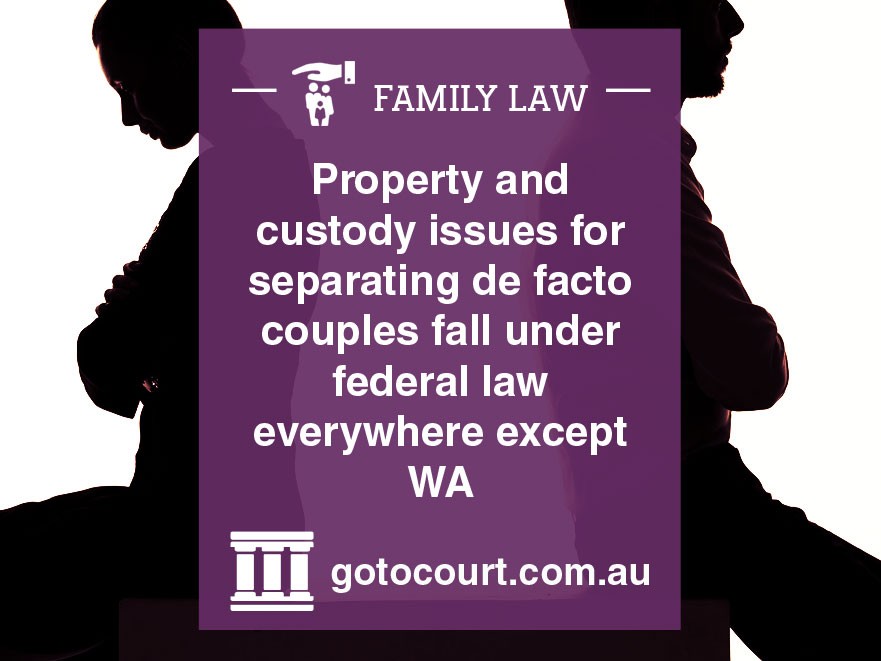Call our lawyers
now
or,
have our lawyers
call you
De Facto Relationships in Australia
Updated on Nov 03, 2022 • 6 min read • 1619 views • Copy Link
De Facto Relationships in Australia
A de facto relationship is a relationship in which a couple lives together on a genuine domestic basis. This definition is the same across Queensland, New South Wales, Victoria, Northern Territory, South Australia, Western Australia, Tasmania, and the Australian Capital Territory.
Couples who are same sex or opposite sex are included in the definition of de facto relationship under Australian law. A couple by marriage or who are related by family cannot be considered to be in a de facto relationship. However, if a person is legally married they can still be considered to be in a de facto relationship with another person they are not married to.
A person would not have a de facto partner unless they have lived together as a couple for two years without separation. Therefore, the length of time to be considered de facto is two years. However, if there are children or substantial contributions to joint property, exceptions are made to this rule.
De facto relationships are governed under the Family Law Act 1975. This means that your rights regarding property settlement, child maintenance and separation are dealt with under the Family Law Act 1975. De facto relationships in Western Australia are governed by the Family Law Act 1997 (WA), however.
Meaning of de facto relationship
There is no singular meaning of a de facto relationship. Each case is examined individually and the specific circumstances of the relationship taken into consideration. You can also be considered to be in more than one de facto relationship at a time. The Family Law Act 1975 specifically acknowledges that a person can be in a de facto relationship regardless if they are in another de facto relationship. Meaning that a de facto relationship does not need to be mutually exclusive. Because the definition of de facto depends on the particular circumstances of a couple, the law has formulated a set of factors to determine whether a couple are (or were) de facto or if it is less-serious.
Determining whether a couple is in a de facto relationship
The factors which the law considers when determining whether a couple is in a de facto relationship include the following:
- Whether the couple are married;
- How long the couple have been together in their relationship;
- Whether the relationship was sexual in nature;
- Financial dependency;
- The degree of a mutual commitment to a shared life;
- Whether the relationship is registered in an Australian state or territory;
- Property ownership and use;
- Care and support of children;
- The public aspects of the relationship, such as reputation.
Registering a de facto relationship
Most states and territories allow you to register a de facto relationship through the state’s Registry of Births, Deaths and Marriages. This provides you with a certificate which can be used as proof of the de facto relationship and how long you have been together.
A registered relationship or civil union may also create rights for property division, even though you may not have lived together for two years.
Breakdown of a de facto relationship
Most de facto relationships end amicably. Sometimes, however there are dispute regarding the division of property or children. Upon the breakdown of a de facto relationship, there are three ways to sort out how to divide property:
- By agreement without court involvement;
- Through an agreement formalised by the court through an application for Consent Orders; or
- By applying to the court for orders.
The courts can make an order for the division of any property that you own together or separately. They may also order a split of any superannuation, or that one party pay spousal maintenance.
The net asset pool will include anything acquired before, during, or after separation. It does not matter whether the property was owned jointly or individually. When determining a property settlement, the court evaluates the types of contributions – financial and non-financial – made by either person, as well as their future needs.
Rights to court orders
In Western Australia, if you have been in a de facto relationship, you need to apply to the Family Court of Western Australia to resolve issues relating to children or property.

In all other Australian states and territories, you can apply to either the Family Court or the Federal Circuit Court. This means your family law matters will be determined in the same manner as for a married couple getting divorced.
De Facto Criteria
Before you can make an application to the courts you need to ensure that you meet the definition of de facto. That is, you should be able to prove some of the following:
- Your relationship lasted for at least two years; or
- There is a child or children of the relationship; or
- You have made substantial financial or non-financial contributions to the other person’s property;
- A serious injustice would be caused to you as a homemaker or parent if property was not divided; or
- The de facto relationship was registered in a state or territory.
The courts will not make an order unless they consider it just and equitable to do so.
Which court?
Ordinarily, application should be made to the Federal Circuit Court unless the matter involves complex family law issues such as:
- International child abduction or international relocation;
- Specialised medical procedures for a child or children;
- Contravention of parenting orders;
- Serious allegations of the sexual or physical abuse of a child or children, or serious controlling family violence; or
- Other complex questions of law.
In all states and territories, you must apply for financial orders within two years of separation from your de facto partner. Otherwise you will need to seek permission from the court to apply. More information about time limits and family law can be found in our dedicated article, Time Limits in Family Law Matters.
Death of a de facto partner
If you are considered to be in a relationship and your partner dies, then you have the same rights as a married person. This includes rights and entitlements regarding the following:
- A share of an estate where no Will exists (that is, your partner has died ‘intestate’);
- The right to challenge the Will if not adequately provided for;
- Receive compensation entitlements under workers compensation law if your partner dies during the course of employment; and
- Claim social security entitlements.


Affordable Lawyers
Our Go To Court Lawyers will assist you in all areas of law. We specialise in providing legal advice urgently – at the time when you need it most. If you need a lawyer right now, today, we can help you – no matter where you are in Australia.How It Works








1. You speak directly to a lawyer
When you call the Go To Court Legal Hotline, you will be connected directly to a lawyer, every time.


2. Get your legal situation assessed
We determine the best way forward in your legal matter, free of charge. If you want to go ahead and book a face-to-face appointment, we will connect you with a specialist in your local area.


3. We arrange everything as needed
If you want to go ahead and book a fact-to-face appointment, we will connect you with a specialist in your local area no matter where you are and even at very short notice.




















